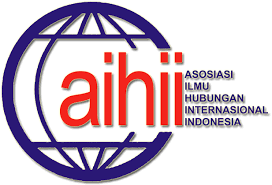Global Politics and Religious Ethics Discourse: Between Tabatabai and Hamka
Abstract
The dynamics of global politics are increasingly complex. Various approaches commonly used to analyze these dynamics often fail to capture the essence of it so that new approaches are needed that take into account various dimensions, including ethics, which are starting to become a concern of related experts. Through Frost's approach to the important position of the normative paradigm in the study of International Relations, this article offers a discourse on religious ethics as the initial pioneering alternative thinking of political philosophy. In this article, the ethical theory of contemporary Iranian philosopher, Allamah Tabatabai, is explored with consideration that Middle Eastern geopolitics influenced the birth of this thought. The Tabatabai thought is elaborated with the idea of religious ethics from the great Southeast Asian thinker, Buya Hamka. The technical consideration for choosing these two figures is because there is a close interdisciplinary approach, namely interpretations, Sufism and philosophy. The study found a close link between the thought of Tabatabai and Hamka in religious ethics with global political issues. By carrying out further research, it is possible to elaborate this finding for developing the basis of the metatheory of Political Science and International Relations in Islamic perspective.
Downloads
References
Abdullah, Saeed. (2005). Approaches to the Quran in Contemporary Indonesia. London: Oxford University Press.
Aljunied, Khiarudin. (2016). Reorenting Sufism: Hamka and Islamic Mysticm in the Malay World. Project Muse No.101. New York: Cornell University Press.
Amid, Masoud. (1394). Rabeteh Din va Akhlagh az Didghah Allameh Tabatabai, Pazouheshgah Falsafi Daneshkadeh Adabiyat va Oloom Ensani. Vol.155. Tabriz: Tabriz University.
Berkhofer, Robert F. (1997). Beyond the Great Story: History as Text and Discourse. Cambridge: Harvard University Press.
Chernoff, Fred. (2007). Theory and Metatheory in International Relations: Concepts and Contending Accounts. New York: Palgrave Macmillan.
Devani, Amir., dan Rahim, Dehghan. (2015). Akhlagh Mobtani bar Tabeat dar Andisheh Allameh Tabatabaie. Dalam: Akhlagh Vahyani Journal 3(8). Qom: Pazouhesghah Oloom Vahyani Maarij.
El-Jaquene, Ferry Taufiq. (2018). Buya Hamka: Kisah dan Catatan dari Balik Penjara. Yogyakarta: Araska.
Ehvan, Mohammad. (1390). Peyvand Din va Akhlagh az Mazhar Allameh Tabatabai. Dalam: Quran va Hadis Journal 7,( 22). Tehran: Al-Zahra University.
Fakhry, Majid. (1991). Ethical Theories in Islam. Leiden-New York: EJ. Brill.
Frost, Mervyn. (1986). Towards a Normative Theory of International Relations. UK: Cambridge University Press.
Frost, Mervyn. (1996). Ethics in International Relations: A Constitutive Theory. UK: Cambridge University Press.
Frost, Mervyn. (2009). Global Ethics: Anarchy, Freedom and International Relations. London and New York: Routledge.
Frost, Mervyn. (2012). On Teaching Ethics in International Relations: Questions and Answers. Dalam: International Studies Perspectives: Vol.13, pp. 7–9. Oxford: Oxford University press.
Hamka. (2015). Tafsir Al-Azhar. Jakarta: Gema Insani.
Hamka. (2015). Lembaga Hidup. Jakarta: Republika Penerbit.
Hamka. (2015). Falsafah Hidup. Jakarta: Republika Penerbit.
Hamka. (2015). Tasawuf Modern. Jakarta: Republika Penerbit.
Hamka. (2015). Lembaga Budi. Jakarta: Republika Penerbit.
Haris, Abd. (2010). Etika Hamka : Konstruksi Etik Berbasis Rasional Religius. Yogyakarta: IAIN Sunan Ampel Press dan LKIS.
Kermani, Aziz Allah Afshar. (1390). Maratib Fazilat va Akhlagh az Mazhar Allameh Tabatabai. Dalam: Quran va Hadis Journal, vol.8. Tehran: Al-Zahra University.
Khalili, Mostafa. (1391). Akhlagh Tohidi az Didghah Allameh Tabatabai. Dalam: Akhlagh Vahyani Journal, Vol. 1(1) 125-144. Qom: Pazouhesghah Oloom Vahyani Maarij.
Mahdavinejad, Mohmmad Hossein, (1391). Tahlil Falsafi az Mabna Ensan Senakhti va Angizeh Akhlaghi da Andisheh Allameh Tabatabai. Dalam: Hekmah Sadrai Journal, Vol.1 (1). Tehran: Payam Noor University.
Ramezani, Reza. (1395). Ara akhlaghi Allamah Tabatabai. Tehran: Sazman Entesharat Pazouheshgah Farhang va Andisheh Eslami.
Rush, James R. (2017). Adicerita Hamka: Visi Islam Sang penulis Besar untuk Indonesia Modern. Jakarta: Gramedia.
Sarvar, Vahid Yadegari., dan Inayatollahi, Sharefi. (1394). Tafsir Nou az Vaghegara Allameh Tabatabai. Dalam: Akhlagh Journal, Vol.8, no.30. Qom: Daftar Tablighat Eslami Hauzeh Ilmiyeh.
Shanzeri, Jafar., dan Abdollahi, Shirin. (2015). Akhlagh Sekolar va Akhlagh Dini. Dalam: Akhlagh Journal, vol.2(5). Qom: Daftar Tablighat Eslami Hauzeh Ilmiyeh.
Tabatabai, Mohammad Hossein. (1387). Tafsir Almizan. Qom: Al-Nasr Al-Islami.
Taji-Farouki, Suha. (2015). The Quran and Its Readers Worldwide. London: Oxford University Press.
Ulum, Mas’ut. (2007). Urgensi Tasawuf dalam Kehidupan Modern: Telaah atas Pemikiran Tasawuf Hamka. Tesis. Yogyakarta: Jurusan Akidah Filsafat, Universitas Negeri Sunan Kalijaga Yogyakarta.








